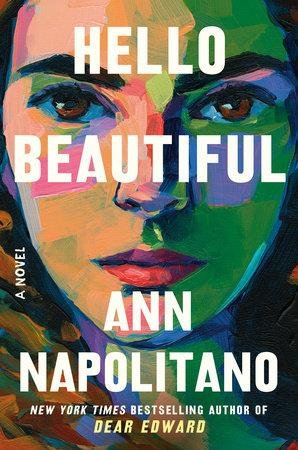
Families. They can be great or not. They don’t mean to hurt you, but too often they do. In Napolitano’s 2023 novel, William Waters was raised without love or attention, his parents having withdrawn into silence after the death of his three-year-old sister when he was only six days old.
He finds respite and respect on the basketball court, and friends among his teammates. At college, on a sports scholarship at Northwestern, he meets Julia Padavano, the oldest of four tight-knit sisters and is welcomed into their family. Julia’s father calls her a rocket: she knows what she wants and won’t let anything get in the way. William is a welcome and malleable companion, happy to have her tell him what to do.
When he suffers a career-ending injury, he begins a descent into darkness. His teammates and the Padavanos stand by him. Still, these relationships—between William and those around him, between the Padavano sisters, between their parents—are challenged as the story unfolds.
I’d been told this novel, loosely based on Louisa May Alcott’s Little Women and infused with Walt Whitman’s poetry, was a tear-jerker. For me, not so much. It was enjoyable for sure—certainly enough so to distract me from the news—but I found the characters too shallow to engage my emotions. Admittedly, this is often a problem for me with stories that have multiple main characters and multiple points of view.
The writing in some parts of the story, especially one long night involving William, is just amazing. I loved the descriptions of one sister’s murals and their effect on others. There were some parts that I questioned, though, such as the way William’s parents completely shut down. I was a little dismayed by the depiction of William’s teammate and best friend Trent who seems to be in the story only to provide him with unstinting support and love. As a Black male, Trent struck me as a riff on the mammy stereotype.
Kirkus, home to the Kirkus Prize and celebrated book reviews, places Hello, Beautiful in the category of literary fiction. A subject of much discussion among my writer friends, categories and genres have undergone many changes. It used be that fiction was divided between literary fiction and genre fiction, which included romance, mystery, science fiction, horror, etc.
As many of the books in these genres have become so well-written that they qualify as literary (as some already were, but that’s another soapbox), literary has become a catchall for everything else. New genres have been added to try to identify books that are well-written, but a lighter read, perhaps, than people might think of when they hear literary: women’s fiction, upmarket fiction, book club fiction. However, as you can imagine, there has been pushback against these new genres.
Defining the term “literary” is a discussion for another day. One of my book clubs, the one I’ve been a member of for decades, differentiates between difficult reads and lighter reads. We include both, of course, but like to mix it up. Some books take a little more effort on the reader’s part, a little more attention. This novel was not difficult to read, which is a plus for many readers. Another plus is that it explores family and love in new and fresh ways. It’s won literary awards and been selected for Oprah’s Book Club.
Families are complicated. They can be wonderfully supportive. However troubled the relationships over the years, siblings are—or so my mother’s sister told me as she lay dying—the only ones who remember what you do. We also sometimes come to appreciate once-despised parents when we become parents ourselves. Not always, of course.
What I appreciate about this story is Napolitano’s exploration of one family’s story and of different ways of being together.
What would you expect to find in a literary novel? What’s a story about families that you would recommend?
To my mind, literature has to be more than just “well-written.” There has to be an exploration of some compelling human issue or a theme with questions that are looked at and thought about. I’m not too articulate about what I mean, but a mystery or light read, no matter how well-written, does not automatically qualify as literature. If the reader doesn’t have to struggle a bit, or think deeply about what is being read, it’s fun–I read quite a bit of light fiction–but nope, not literature. And the second I see categories such as “women’s fiction” or “book club fiction,” I don’t even consider reading it.
As for Hello, Beautiful, I was amazed by the critical reviews, which praised it considerably, while most reader reviews I found panned it to some degree. I also found it engaging at first, but it became stereotyped and manipulative. I sensed that the author was trying to steer readers into an emotional response that the book didn’t merit. And any parallel to Little Women was more aspirational than real. Just because there are four sisters and one dies doesn’t quite deserve the comparison. Not a terrible book, I didn’t hate it, but kind of trite and a “crowd-pleaser.”
I agree! Thanks for articulating these issues so well, Elizabeth.